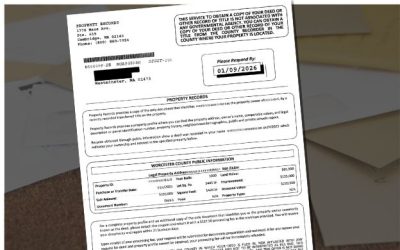
Jul 17, 2025 | Home Mortgage, Housing Market, Mortagage Tips, Mortgage, Mortgage Tips, News, Real Estate
You’ve found your dream home in Massachusetts or New Hampshire. The offer is in, the inspection went smoothly, and closing day is in sight. But then—bam!—a title defect surfaces, and suddenly your seamless transaction feels more like a nightmare.
At The Law Office of David R. Rocheford, Jr., P.C., we know how crucial a clean title is to a successful closing. Here are five of the most common hidden title issues we see—and how our meticulous title services can keep your deal on track.
An old mortgage that was paid off but never officially released in the registry? It’s more common than you’d think. Without a proper discharge, the lender still technically holds a claim, and that can stop your sale cold.
Our solution: We identify undischarged mortgages early and work directly with lenders to obtain and record releases—no surprises on closing day.
Contractors, municipalities, and even HOA’s can place liens for unpaid debts. Whether it’s back taxes or a forgotten utility bill, these liens must be cleared before you take ownership.
Our solution: Our team runs comprehensive lien searches and coordinates payoff or discharge so your title is free and clear.
Easements and Boundary Disputes
That beautiful backyard? It may have a utility easement running through it—or worse, a neighbor disputing the boundary line. These issues can impact how you use the property.
Our solution: We’ll flag any recorded easements or encroachments and help you understand how they affect your rights as a buyer.
Clerical mistakes happen. A misspelled name, incorrect legal description, or filing error can create confusion over ownership and cloud your title.
Our solution: Our attorneys comb through public records and fix errors before they derail your deal.
Forged or Fraudulent Documents
Unfortunately, forged deeds and fraudulent transfers do exist. If someone in the property’s past didn’t legally own it, neither will you—until it’s resolved.
Our solution: Our title exams are designed to spot these red flags and protect you from costly legal battles later.
Why Title Matters—and Why We’re Your Best Ally
Your home is likely the biggest purchase of your life. Don’t let hidden title defects steal your peace of mind. At The Law Office of David R. Rocheford, Jr., P.C., we specialize in thorough title examinations, escrow services, and smooth closings for Massachusetts and Southern New Hampshire.
Let us handle the legal details so you can focus on your new chapter.
Providing title, escrow, closing and settlement services to clients throughout Massachusetts and New Hampshire
“I would highly recommend David as a closing attorney. I have known David and have been using his office for many years. David’s professionalism when dealing with me, my closing department and most especially my clients has been always exemplary.”
SENIOR LOAN OFFICER, SHAMROCK FINANCIAL SERVICES
“The Law Office of Attorney David R. Rocheford, Jr. is by far the most exceptional real estate law office that I have had the pleasure of working with. The professionalism is by far second to none.”
SENIOR LOAN OFFICER, SALEM FIVE MORTGAGE SERVICES
“Attorney David Rocheford has provided settlement and title services for me and Greenpark Mortgage several years. He has assisted all of my clients, including my family and friends with mortgage closings. Always providing excellent service. Reliable and trustworthy!”

Jun 19, 2025 | Around The Home, Around The Hoome, Artificial intelligence, Buying Real Estate, Chapter 7 Bankruptcy, Consumer Tips, Credit Scoring, Fair Housing, Federal Reserve, FHFA, Financial Crisis, Financial Fraud, Financial Reports, Foreclosure, Happy Thanksgiving, Holidays, Home Building Tips, Home Buyer Tips, Home Buying Tips, Home Care, Home Care Tips, Home Closings, Home Decorating, Home Financing Tips, Home Maintenance, Home Mortgage, Home Mortgage Tips, Home Seller Tips, Home Selling Tips, Home Tips, Home Values, Homebuyer Tips, Homeowner Tips, Housing Analysis, Housing Market, Interesting Stuff, Investment Properties, Legislation, Market Outlook, Mortagage Tips, Mortgage, Mortgage Guidelines, Mortgage Lenders, Mortgage Rates, Mortgage Tips, mortgage-rates-whats-ahead-september-17-2012, News, Organization Tips, Personal Finance, Probate Law, Rankings, Real Estate, Real Estate Agent Information, Real Estate Definitions, Real Estate Tips, Real Estate Trends, Realtors, Selling Real Estate, Selling Your Home, Short Sales, Statistics, Success, Taxes, The Economy, Title Insurance
Whether you’re buying with cash, investing from abroad, transferring property to a family member, or just trying to close without a headache, you’ll want to know what can trigger federal scrutiny — and how to stay off the radar.
From flagged wire transfers and shell companies to gift-of-equity sales and land near military zones, this isn’t your average title-and-keys situation.
It’s real estate with a side of national security, tax enforcement, and financial crime prevention.
Is Big Brother Watching Your Home Sale?
What Buyers and Sellers Should Know About Federal Oversight
You’re Not Paranoid — They Might Actually Be Watching
What you didn’t know on how federal agencies keep tabs on select real estate transactions.
Your Closing Packet Could Be a Federal File
How Your Paper Trail Might Raise Red Flags — And What You Can Do About It
What the FBI, IRS, and Homeland Security
Could See in Your Closing Docs
We’re unpacking what agencies might spot inside your deal’s fine print.
Caught in the Crosshairs? What Triggers Federal Interest in Your Home Sale
The Top Red Flags That Could Invite a Closer Look from Washington
Cash, LLCs, or Land Near a Base? You Might Just Be a Target
The warning signs that put your deal on the government’s radar — and how to stay clear.
Follow the Money: How the IRS Tracks Financial Crimes Through Real Estate
From Unreported Income to Shell Game Schemes
— What IRS-CI Is Looking For
Your Closing Could Be an Audit Trigger — Here’s How the IRS Sees It
Explore the patterns, documents, and loopholes that turn ordinary deals into criminal cases.
Providing title, escrow, closing and settlement services to clients throughout Massachusetts and New Hampshire
“As a realtor, the Rocheford team went above and beyond to make sure my client was not only protected from a legal standpoint but also operated in a timely manner to execute the sale of my client’s dream home.
Thank you for the great experience for myself and my client! Looking forward to our next deal together!”
Realtor®
“I don’t usually use attorneys that often. But if an attorney is needed, I couldn’t recommend this law office enough. I always pride myself on responding quickly to emails and calls, but I was in awe of how fast paralegal Robert Heckman would respond to us. We sold our house a couple months ago and then did a two-part land swap with neighbors and my folks, and both transactions were seamless, including coming in to sign paperwork.
In short, if you need a law office that is responsive and attentive to detail, definitely consider them!”
Leominster, MA
“Excellent, conscientious and professional.
The communication throughout our Real Estate transaction was better than expected. We thought the fee to be very reasonable considering the work accomplished on our behalf. The law office handled the entire closing without us having to be in attendance….as we requested. I have had experience with very competent lawyers and law firms as the result of my previous profession. I would place this law office right up there among the best in their real estate field of expertise and surprisingly at very reasonable and affordable rates/fees.”
Buzzards Bay, MA

Feb 14, 2025 | Buying Real Estate, Consumer Tips, Home Buyer Tips, Home Buying Tips, Home Mortgage, Home Mortgage Tips, Home Seller Tips, Home Selling Tips, Home Tips, Housing Market, Investment Properties, Mortagage Tips, Mortgage, Mortgage Lenders, Mortgage Tips, News, Real Estate, Real Estate Agent Information, Real Estate Tips, Real Estate Trends, Realtors, Selling Real Estate, Selling Your Home
Below is our summary of significant legislative development that impacts our industry. The Massachusetts General Court has introduced a bill titled “An Act protecting consumer rights in purchasing safe and habitable homes.” This bill, presented by Representative Brian M. Ashe and others, aims to enhance consumer protection by ensuring that buyers have the right to conduct home inspections when purchasing residential properties. Below, I have provided a detailed summary of the key provisions and implications of this bill for real estate professionals.
The bill aims to ensure that buyers have the right to home inspections when purchasing residential properties, including houses and condominiums.
An inspection involves a licensed home inspector evaluating various components of the property, such as heating, cooling, plumbing, electrical systems, structural components, foundation, roof, and more.
- Buyers have the right to have the property inspected within 10 days of the seller accepting their offer, unless a different period is agreed upon in writing.
- Sellers cannot condition the acceptance of an offer on the buyer waiving their right to an inspection, except in certain cases like auctions or sales to close family members.
Every offer to purchase must include a clause informing the buyer of their right to an inspection and the conditions under which they can revoke the offer if significant defects are found.
- Sellers must comply with the inspection rights and cannot accept offers that waive these rights unless specific exceptions apply.
- Violations by sellers can result in damages to the buyer and civil penalties.
An inspection involves a licensed home inspector evaluating various components of the property, such as heating, cooling, plumbing, electrical systems, structural components, foundation, roof, and more.
This bill is designed to protect consumers by ensuring they have the opportunity to identify any significant issues with a property before finalizing the purchase.
The legislation has several implications for for real estate agents, brokers and Realtors:
Disclosure and Compliance:
- Real estate agents must ensure that all offers to purchase include the required language informing buyers of their right to a home inspection.
- Agents must be aware of the 10-day inspection period (or longer if agreed upon) and ensure that this is communicated clearly to both buyers and sellers.
- Agents cannot advise or encourage sellers to condition the acceptance of an offer on the buyer waiving their right to an inspection, except in specific cases like auctions or sales to close family members.
- They must ensure that sellers do not accept offers from buyers who indicate an intention to waive the inspection right, unless the exceptions apply.
Legal and Financial Implications:
- If a seller violates the provisions of this bill, the real estate agent could be implicated in any resulting legal actions or penalties. This includes potential civil penalties and damages to the buyer.
- Agents need to stay informed about the legal requirements and ensure their practices comply with the new regulations to avoid liability.
- The bill enhances consumer protection, which may increase buyer confidence in the real estate market. Agents can use this as a selling point to assure buyers that their rights are protected.
- Agents should be prepared to guide buyers through the inspection process and help them understand their rights and options if significant defects are found.
Overall, real estate professionals will need to adapt their practices to ensure full compliance with the new regulations, prioritize transparency, and protect the interests of their clients. This may involve additional training and adjustments to standard operating procedures.
Statutory Offer to Purchase Language
According to the bill each offer to purchase a residential structure or residential condominium unit shall include the following language:
“Buyer is entitled under section 115 of chapter 93 of the General 33 Laws to choose to have the premises inspected at Buyer’s expense within 10 days, or longer as Seller and Buyer may agree in writing, of Seller’s acceptance of Buyer’s offer to purchase. Unless one of the exceptions in said section 115 applies, neither Seller nor Buyer may make acceptance of this offer to purchase contingent upon waiver, limitation or restriction of Buyer’s right to choose to obtain a home inspection. Should Buyer choose to have the premises inspected, if it is the inspector’s opinion that the premises contain serious structural, mechanical or other defects and if the repair of such defects would cost Buyer in the aggregate more than the amount indicated by the Buyer herein ($________), then Buyer shall have the option of revoking this offer to purchase by written notice to the Seller or Seller’s agent within 5 business days of the date of the inspection, or longer as Seller and Buyer may agree in writing. Such notice shall be accompanied by a copy of the inspector’s opinion and a copy of cost estimates obtained by Buyer.”
Understanding and complying with this new legislation is crucial for all real estate professionals. By staying informed and adapting practices, we can better serve our clients and uphold the integrity of our industry. If you have any questions or need further clarification on this bill, please do not hesitate to reach out to one of our Real Estate Attorneys.
Providing title, escrow, closing and settlement services to clients throughout Massachusetts and New Hampshire
“I would highly recommend David as a closing attorney. I have known David and have been using his office for many years. David’s professionalism when dealing with me, my closing department and most especially my clients has been always exemplary.”
SENIOR LOAN OFFICER, SHAMROCK FINANCIAL SERVICES
“The Law Office of Attorney David R. Rocheford, Jr. is by far the most exceptional real estate law office that I have had the pleasure of working with. The professionalism is by far second to none.”
SENIOR LOAN OFFICER, SALEM FIVE MORTGAGE SERVICES
“Attorney David Rocheford has provided settlement and title services for me and Greenpark Mortgage several years. He has assisted all of my clients, including my family and friends with mortgage closings. Always providing excellent service. Reliable and trustworthy!”
Jul 9, 2024 | Homeowner Tips, Mortagage Tips, Mortgage Lenders
 In real estate transactions, the use of a power of attorney can be a critical tool, especially when the principal is unable to be physically present to sign documents. Understanding the nuances of power of attorney in real estate transactions is crucial for all parties involved. Here, we delve into the intricacies of power of attorney, shedding light on its types, considerations, and potential pitfalls.
In real estate transactions, the use of a power of attorney can be a critical tool, especially when the principal is unable to be physically present to sign documents. Understanding the nuances of power of attorney in real estate transactions is crucial for all parties involved. Here, we delve into the intricacies of power of attorney, shedding light on its types, considerations, and potential pitfalls.
Types of Power of Attorney
There are different types of power of attorney, each with its own implications. A general power of attorney grants broad authority to the agent, allowing them to act on behalf of the principal in almost all regards. On the other hand, a limited power of attorney is specific to a particular purpose or transaction, providing a narrow grant by the principal to an agent. Additionally, the durable power of attorney allows the agent to continue acting on behalf of the principal if they become disabled or incapacitated.
Key Considerations
When dealing with power of attorney in real estate transactions, specific granting clauses and signature blocks are crucial. It is essential to ensure that the power of attorney is durable to be valid for current transactions. Reviewing the entire document is also emphasized to ensure it grants sufficient authority for the intended actions.
Recording Requirements
Recording requirements for power of attorney documents are critical. The original document must be recorded at the registry of deeds where the land is located. It is noted that recording a copy is not sufficient, and the original document is essential for reliance on the power of attorney.
Common Issues and Red Flags
There are common issues to watch out for when dealing with power of attorney in real estate transactions. Self-dealing transactions and non-arms-length considerations can lead to potential title claims due to breaches of fiduciary duty by the agent. It is important to ask questions and vet the use of power of attorney to ensure its legitimacy.
By being aware of the types of power of attorney, considerations for its use, recording requirements, and common issues to watch out for, real estate professionals can navigate power of attorney transactions with confidence. Understanding the legal and ethical standards surrounding power of attorney in real estate is crucial for ensuring compliance and protecting the interests of all parties involved. If you have any questions at all about using Powers of Attorney in Massachusetts real estate transactions, please give one of our Attorneys a call.
Mar 15, 2018 | Mortagage Tips
 U.S. military veterans have opportunities to enjoy some richly-deserved benefits in other aspects of their lives, including some special options for financing their homes. VA loans may give active military personnel, retired veterans, and sometimes surviving family members of veterans the ability to purchase homes that might not prove available to them through more conventional mortgage loans.
U.S. military veterans have opportunities to enjoy some richly-deserved benefits in other aspects of their lives, including some special options for financing their homes. VA loans may give active military personnel, retired veterans, and sometimes surviving family members of veterans the ability to purchase homes that might not prove available to them through more conventional mortgage loans.
But the mere fact that you can do a thing doesn’t necessarily mean that you should. In some circumstances, military home seekers may find other types of loan options more amenable to their specific needs.
If you’ve decided to pursue a mortgage loan during or following your military career, you may want to examine these considerations before leaping into a VA loan application.
Loan Qualifications and Limits
A VA loan can open the door to home ownership for cash-strapped or credit-challenged military personnel who might otherwise struggle to get a conventional mortgage loan. This type of loan offers tremendous flexibility in qualifying factors such as credit scores and debt-to-income ratios; in fact, VA loans may come with no maximum debt ratio at all.
Potential For Zero Down Payment
Additionally, VA loans do not require the down payment typically needed for a more conventional or FHA loan. (The only other loan with no down payment requirement, the USDA loan, applies to rural areas and comes with some prohibitive income restrictions.)
The elimination of a mandatory down payment, coupled with the relaxed financial qualifications, can make a VA loan the most sensible choice for individuals who suffer from limited resources, “upside-down” credit and short credit histories.
Additional Qualifications To Consider
That said, VA loans usually impose some qualifications of their own — qualifications which may not appeal to some buyers. For one thing, a VA loan can only go toward the primary place of residence, not a summer cottage or second home. Military personnel who already own a home may therefore find this restriction a deal-breaker for their specific needs.
VA Loan Limits
VA loan amounts may also impose varying guaranty limits depending on where you live. The guaranty limit refers to your VA entitlement, the portion of your loan that escapes the down payment requirement.
In most counties, that limit currently levels off at 435,100, although in several major metropolitan markets it can range as high as 679,650. If you want to buy a more expensive home, you may end up making a down payment — potentially making your VA loan competitive against other loan options.
As always, your best move is to call your trusted real estate professional to discuss the VA home purchase process and find out if it’s the best option for you.
Aug 29, 2016 | Mortagage Tips
 Last week’s economic reports included readings on new and existing home sales, a speech by Fed Chair Janet Yellen, and a report on consumer sentiment. Weekly reports on mortgage rates and new jobless claims were also released.
Last week’s economic reports included readings on new and existing home sales, a speech by Fed Chair Janet Yellen, and a report on consumer sentiment. Weekly reports on mortgage rates and new jobless claims were also released.
New Home Sales Rise in July as Pre-Owned Home Sales Fall
Sales of new homes jumped in July to a seasonally-adjusted annual rate of 654,000 sales, which surpassed expectations of 579,000 sales and June’s downwardly-revised reading of 582,000 sales. This was the highest reading for new home sales since 2008 and represented a 31.30 percent increase since July 2015.
Builders were seen by analysts as addressing the need for more affordable homes; this trend contributes to a healthy housing market by supplying homes for a wider range of buyers. First-time buyers play a vital part in housing markets as their purchases enable current homeowners to buy larger homes or relocate.
Sales of pre-owned homes fell 3.20 percent to a seasonally-adjusted annual rate of 5.39 million sales as compared to expectations of 5.59 million sales and June’s reading of 5.57 million sales. Year-over-year, sales were 1.60 percent lower. Limited inventories of available pre-owned homes have narrowed buyer options; increasing prices and narrow choices were seen as factors contributing to lower sales. There was a 4.60 month supply of available homes in July. Real estate pros typically consider a six months a normal reading for homes on the market.
Lawrence Yun, chief economist for the National Association of Realtors®, noted that a slowdown in home appraisals may have contributed to July’s lower sales reading for pre-owned homes. Low mortgage rates prompted a surge in refinancing which created a backlog in home appraisals. While low mortgage rates may entice home buyers, stricter mortgage requirements can also keep prospective buyers at bay.
Federal Reserve Chair Janet Yellen indicated that the stage could be set for a federal rate increase as early as next month. If the Fed hikes its target federal funds rate, interest rates for consumer credit and mortgages can be expected to rise.
Mortgage Rates Hold Steady; New Jobless Claims Fall
Freddie Mac reported that fixed mortgage rates for 30 and 15-year loans were unchanged at 3.43 and 2.74 percent respectively. The average rate for a 5/1 adjustable-rate mortgage was one basis point lower at 2.75 percent. Discount points averaged 0.60, 0.50 and 0.40 percent.
New jobless claims were lower last week. 261,000 new jobless claims were filed against expectations of 264,000 new claims and the prior week’s reading of 262,000 new claims filed. Declining jobless claims can indicate strengthening labor markets, but can also indicate that workers are leaving the labor markets.
Consumer sentiment declined slightly in August due to concerns over the upcoming presidential election. Analysts expected a reading of 91.0 for August, but the reading for August was revised from 90.4 to 89.80.
What’s Ahead
Next week’s scheduled economic news includes reports on pending home sales, inflation, construction spending and consumer confidence. National unemployment, non-farm payrolls and ADP payrolls are also scheduled.
















 In real estate transactions, the use of a power of attorney can be a critical tool, especially when the principal is unable to be physically present to sign documents. Understanding the nuances of power of attorney in real estate transactions is crucial for all parties involved. Here, we delve into the intricacies of power of attorney, shedding light on its types, considerations, and potential pitfalls.
In real estate transactions, the use of a power of attorney can be a critical tool, especially when the principal is unable to be physically present to sign documents. Understanding the nuances of power of attorney in real estate transactions is crucial for all parties involved. Here, we delve into the intricacies of power of attorney, shedding light on its types, considerations, and potential pitfalls. U.S. military veterans have opportunities to enjoy some richly-deserved benefits in other aspects of their lives, including some special options for financing their homes. VA loans may give active military personnel, retired veterans, and sometimes surviving family members of veterans the ability to purchase homes that might not prove available to them through more conventional mortgage loans.
U.S. military veterans have opportunities to enjoy some richly-deserved benefits in other aspects of their lives, including some special options for financing their homes. VA loans may give active military personnel, retired veterans, and sometimes surviving family members of veterans the ability to purchase homes that might not prove available to them through more conventional mortgage loans. Last week’s economic reports included readings on new and existing home sales, a speech by Fed Chair Janet Yellen, and a report on consumer sentiment. Weekly reports on mortgage rates and new jobless claims were also released.
Last week’s economic reports included readings on new and existing home sales, a speech by Fed Chair Janet Yellen, and a report on consumer sentiment. Weekly reports on mortgage rates and new jobless claims were also released.